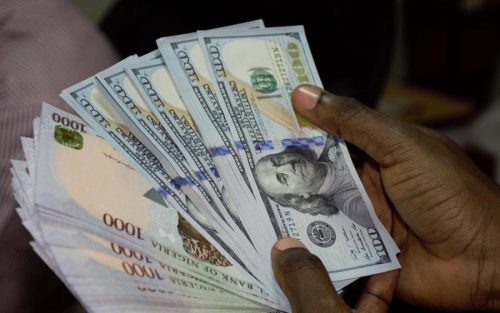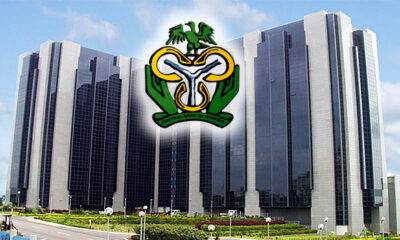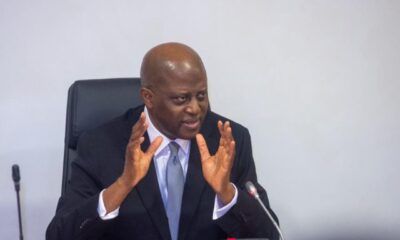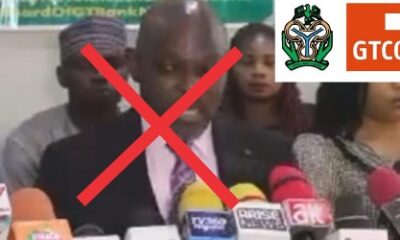The naira fell slightly to the dollar at the parallel market a few hours after the Central Bank of Nigeria on Tuesday announced the discontinuity of forex supplies to the Bureau de Change Operators in the country.
The CBN Governor, Godwin Emefiele, announced the end of forex sales and new license approval after the Monetary Policy Committee’s two-day meeting in Abuja on Tuesday.
He expressed the MPC’s disappointment over their continuous abuse of the privilege.
At the end of the meeting, the MPC retained the lending rates and other parameters.
Reading the MPC’s decision, Emefiele said, “Based on the above considerations, the MPC made the decision to hold all policy parameters constant; believing that a hold stance will enable the continued permeation of current policy measures in supporting the recorded growth recovery and macro-economic stability.
“The committee thus decided by a unanimous vote to retain the Monetary Policy Rate at 11.5 percent; retain the asymmetric corridor of +100/-700 basis points around the MPR; retain the CRR at 27.5 percent, and retain the Liquidity Ratio at 30 percent.”
Speaking on the decision to stop forex to the BDCs, Emefiele said the MPC noted with disappointment and great concerns that the BDCs had defeated their purpose of existence to provide forex to the retail users, but instead, they had become wholesale and illegal dealers.
He said, “Operators in the BDC have not reciprocated the gesture to help maintain price stability in the market since the CBN had been selling forex to them.
“They have remained renegade and so greedy, recalcitrant with abnormally high profit from these sales while ordinary Nigerians have been left to feel the pain and therefore suffer.
“Given this rent-seeking behavior, it is not surprising that since the CBN began to sell forex to the BDCs, the number of operators has risen from a mere 74 in 2005 to over 2,700 in 2016, and almost 5,500 BDCs as at today.
“In addition, the CBN constantly receives nothing less than 500 new applications from BDC licenses every month, and we, therefore, begin to wonder, what is in this business that everybody must be in it?”
The BDCs, he observed, had continued to make huge profits while Nigerians suffered in pain.
He said the commercial banks would be monitored to provide forex for the legitimate use of Nigerians.
“The Central Bank will henceforth discontinue the sale of forex to Bureau de Change operators,” Emefiele said.
Meanwhile, the naira fell slightly to the dollar a few hours after the CBN’s announcement.
According to naijabdcs.com, the official websites of the BDCs, the naira which exchanged to the dollars at N503/$ on Monday was bought and sold for N503 and N505 on Tuesday evening.
The CBN had been supplying each licensed BDCs $10,000 twice per week at the rate of N393 with the instruction that they should sell with a margin of N2.
When contacted to respond to the new development, the President, Association of Bureaux de Change Operators of Nigeria, Alhaji Aminu Gwadabe, replied an SMS, “In a meeting with BDCs operators. For now, no comment.”
Economist and former Director-General, Lagos Chamber of Commerce and Industry, Dr Muda Yusuf, said what was happening in the foreign exchange market was a consequence of the CBN’s policy choice of a fixed exchange rate regime and administrative allocation of forex.
He said, “It is a policy regime that has created a huge enterprise around foreign exchange – round-tripping, speculation, over-invoicing, capital flight, etc.
“The action of the apex bank amounts to tackling the symptoms rather than dealing with the causative factors, which is not a sustainable solution.
“It is regrettable that the CBN does not believe in the market mechanism. Yet market systems are time tested as instruments of efficient resource allocation in leading economies around the world.”
He added, “Moving retail forex transactions from BDCs to the banks was like kicking the can down the road. The same issues would manifest even with the banks.”
According to him, the way out of the foreign exchange conundrum was for the CBN to allow the market to function.
He said, “The CBN needs to give the market a chance. Its current approach would continue to deepen distortions in the economy, perpetuate round-tripping, fuel speculation, suppress forex supply, and boost the underground economy.”
A past President, Association National Accountants of Nigeria, Dr Sam Nzekwe, said it was a good decision to stop forex allocation to the BDCs.
He said, “BDC is meant for light travelers, someone that is traveling and has no time to go to the bank who can just stopover at the airport and buy few dollars and travel with it. The CBN was allocating forex to them which was a wrong decision and it is a terrible thing. That is why they encouraged round-tripping.”
According to him, the BDCs need to source their monies themselves because they were doing illegal dealings with the privilege.
The Chairman, Mutual Benefits Assurance Plc, Dr Akin Ogunbiyi, said that it was not appropriate to be allocating scarce forex to the BDCs.
“Why will you allocate something that is so scarce to a set of people. The way to solve the forex problem is to have one single exchange rate so that anywhere you turn to this it is the same rate you get it, there will be some sanity.”
He said it was important to have a single conversion rate.
Some financial experts warned of the possibility of further deprecation of the naira against the dollar following the CBN directive.
A senior lecturer in economics at the Pan Atlantic University, Dr Olalekan Aworinde, said there was a risk of naira depreciation, depending on how the CBN manages foreign exchange.
An economist and a former presidential candidate, Prof Pat Utomi, said people who engaged in exports or any activities that involved dollar exchange would be affected by this ban, adding that the country was at risk of depleting reserves and endangering the economy.
He said, “I think the bottom line is that there is already a challenge to people who are exporting. Foreign exchange is already scarce right now, even for people buying basic travel allowance.
“The real issue is simple. We are not earning as much foreign exchange as we are using. So, we are running the risks of depleting reserves and endangering trades long term. So, there is the pressure to better manage foreign exchange.”
He added that the ban signaled more foreign exchange crises as there would likely be more hoarding of dollars, which would further lead to the depreciation of naira.
Utomi said, “What this ban signal is that there is a foreign exchange crisis. This signal will lead to more hoarding, and lead to a spiral that can make the exchange rate deteriorate much faster because there may not be enough supplies to keep the market reasonable.
“So, prices are going to tumble. People are talking about the one thousand naira to a dollar. God forbid that it happens so quickly but it can happen.”
He advised the government to focus on expanding the economy, especially driving growth in export earnings.

 BIG STORY3 days ago
BIG STORY3 days ago
 BIG STORY4 days ago
BIG STORY4 days ago
 BIG STORY5 days ago
BIG STORY5 days ago
 BIG STORY5 days ago
BIG STORY5 days ago
 BIG STORY4 days ago
BIG STORY4 days ago
 BIG STORY2 days ago
BIG STORY2 days ago
 BIG STORY3 days ago
BIG STORY3 days ago
 BIG STORY3 days ago
BIG STORY3 days ago
























